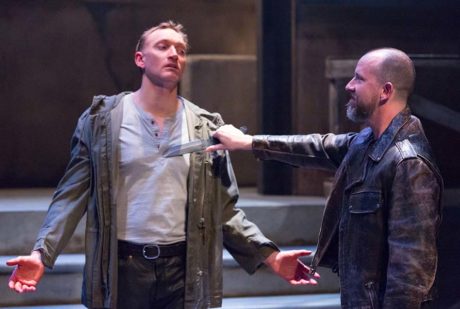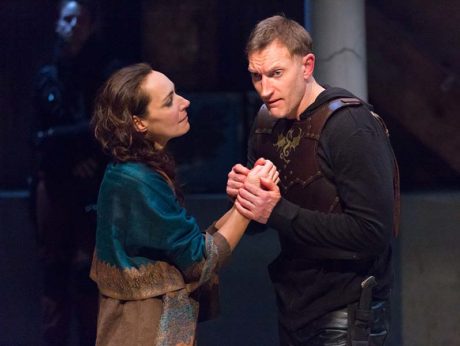Coriolanus is one of Shakespeare’s least-performed plays – probably because it doesn’t fit easily into any of the standard Shakespearean categories. It’s a tragedy, but one without the epic sweep of Othello, Hamlet or Macbeth. Those shows earned their fame by grappling with huge issues and significant figures; Coriolanus deals more with the concerns of the common people. (Big chunks of the play deal with everyday people protesting over the price of grain.) Hamlet and Macbeth are about who will rule the people; Coriolanus is more concerned with the people themselves, and how they deal with their leaders. The Lantern Theater’s new production provides a great opportunity to see this fascinating rarity.

The title character is a Roman general who, after a series of victories against a neighboring state, is tapped to run for the office of Consul. But while he’s a brave soldier, he’s not much of a campaigner. The commoners turn against him – partly because of his stand on the grain issue, partly because of the antagonism of some scheming politicians – and Coriolanus gets branded an enemy of the state and is sent into exile. He soon ends up in the homeland of Rome’s enemies, where he ends up leading an attack on Rome before deciding to make peace instead. Unfortunately for Coriolanus, not everyone is as devoted to peace as he is.
As a protagonist, Coriolanus is harder for an audience to identify with than some of Shakespeare’s other tragic heroes. In part that’s because he doesn’t have big soliloquies like Hamlet or Macbeth do, so it’s harder to get a read on him. And when he gives a speech to his men to psych them up for battle, it doesn’t have the fervor or grandeur of Henry V’s speech to his men. It can be hard to connect with Coriolanus, but in all fairness, he doesn’t always want to be connected with.
Robert Lyons gives a consistently intriguing performance in the title role. We first see him as a brutal warrior; he spends much of Act One covered with blood. But when he returns to Rome, Lyons, with his blunt, hard-edged squint, is so haunted by his war experience that he appears lost, unable to function in the world at large. He’s indignant at having to perform ceremonial political duties – even something as basic as smiling and keeping his mouth shut at the right time. But later, when he returns to the battlefield, he comes alive again. Lyons’ Coriolanus loves being in power, but he’s not so crazy about obtaining that power.
Lyons gets strong support from a gifted cast. Standouts include David Bardeen and Leonard C. Haas as a pair of two-faced politicians, Brian McCann as a power player whose powers fail him, and Charlie DelMarcelle as a surprisingly ruthless enemy. Women get the short shrift in Coriolanus, but Mary Lee Bednarek has a shattering stillness as Coriolanus’ wife, who always appears overwhelmed by the danger her husband puts himself in. And Hannah Van Sciver puts a tart twist on her lines in a series of small roles.

The best performance in this Coriolanus comes from its biggest name: Tina Packer, the longtime leader of one of my favorite theatre companies, Massachusetts’ Shakespeare & Company. As Coriolanus’ wise (and controlling) mother Volumnia, Packer is the play’s voice of reason. And with her gentle, regal tone and rounded vowels, she gives the production dignity and grace.
But as good as Packer is, her scenes point out a flaw in director Charles McMahon’s staging: the deliberation and maturity of Packer’s scenes never meshes with the dynamic energy of the rest of the production. The tonal shifts in her scenes are so drastic that they can be dizzying. Also dizzying are the multiple time periods in the show’s presentation, which switch from the modern day (with TV news cameras covering Occupy Wall Street-like protests) to Shakespearean England (rebels wearing Guy Fawkes masks) to ancient Rome. These shifts are unnecessary, since Shakespeare’s words have resonance no matter when they are set.
Otherwise, McMahon’s production is a very good version of a strong but flawed play. Coriolanus is a wordy play full of characters whose allegiances shift with the wind. If you’re not concentrating closely, it can be easy to get lost. But McMahon’s speedy pace and lightning fast scene transitions give the play focus. Actors make entrances from unexpected locations – the back row of one of the seating sections has been removed to provide a narrow passage for the actors to move around in. And the events are punctuated by some exciting action sequences (marked by J. Alex Cordero’s electric fight choreography).
Drew Billiau’s lighting delivers a smoky setting for the battle scenes and crowd scenes, and Janus Stefanowicz’s costumes sharply delineate the characters’ social classes. Meghan Jones’ set design straddles multiple eras, with marble arches suggesting ancient Rome and warehouse lofts suggesting our time. And Robert Kaplowitz’s music throbs with aggression.
Lantern Theater Company’s fascinating production of Coriolanus is filled with vivid performances and keen insights into the political process, no matter what the era.
Running Time: Two hours and 20 minutes, including an intermission.

Coriolanus plays through April 16, 2017, at the Lantern Theater Company, performing at St. Stephen’s Theater – 10th and Ludlow Streets, in Philadelphia, PA. For tickets, call (215) 829-0395, or purchase them online.




